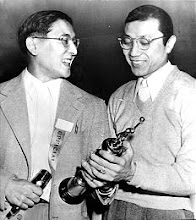5 Buffett Picks at a Discount
This story is an edited version of the original, which appears in the May issue of SmartMoney Magazine. Berkshire Hathaway has its annual meeting Saturday, and is expected to draw 35,000 attendees.
Warren Buffett usually attracts as much public criticism as, say, puppies or Santa Claus. He filed his first tax return at 13 (bicycle deduction: $35), amassed an investment fortune of more than $60 billion by the end of 2007 and has committed most of his wealth to charity. He lives in the same Omaha house he bought in 1958 and argues that people like himself don’t pay enough in taxes.
But Buffett’s stock picks, like just about everything else, tumbled over the past year, and some on Wall Street are grumbling. U.S. stocks fell another 28% after Oct. 16, when Buffett penned a New York Times op-ed piece titled “Buy American. I Am.” The Oracle bet especially wrong on banks and oil over the past year. And after calling derivatives “time bombs” and “financial weapons of mass destruction” in a 2002 letter to shareholders, Buffett noted earlier this year Berkshire Hathaway (BRK.A: 94900.00, +400.00, +0.42%) had 251 derivatives contracts outstanding. Mostly, it had written insurance against the stock market falling, which, of course, it had.
Some critics say Berkshire is suffering from mission creep. Others say buy-and-hold investing is dead. I’m guessing it’s not. I’m guessing that while Buffett admits he made some bad bets over the past year, he made plenty of good ones, too. Some things he bought are selling for well less than he paid, and some long-standing names are newly cheap. So if you ever wanted to mimic the master without paying a Buffett premium, now seems a fine time.
After all, consider the long-term record. When Buffett took control of Berkshire in 1965, it was a withering textile firm with $19 a share in book value—roughly what accountants figure its assets could raise in a sale. At the end of 2008, book value stood at $70,530 a share. That’s a yearly compounded increase of more than 20%, more than double the broad stock market’s annual return during that stretch. Berkshire’s book value has shrunk in only two years during Buffett’s tenure, by 6.2% in 2001 and by 9.6% last year. Of course, Berkshire’s trading price is based as much on what investors see as its earnings power as it is on what the firm might fetch in a liquidation sale. Generally, the stock trades at a big premium. Over the decade ended 2007, it went for 70% more than book value. Now it sits just 30% above it.
As for derivatives, Buffett has said they’re dangerous but not necessarily evil (comparing them to uranium, which can be used for bombs or electricity). When the put options he wrote come due starting in 2019, he said in a March CNBC interview, even if the stock market is 15% below where it was when he wrote the contracts, he’ll still breakeven and will have enjoyed the use of $5 billion in customer cash in the interim. And while that New York Times headline might have been an early call, writers (readers can never be reminded enough) generally don’t write headlines. While Buffett said he’s buying stocks, he also wrote that he didn’t have the “faintest idea as to whether stocks will be higher or lower a month—or a year—from now.”
Truthfully, though, I’m more interested in exploiting Buffett than defending him. The shortest path to being a great investor is to copy one. Berkshire shares might be a good deal, but the firm has a giant stake in financials. Investors who prefer to avoid that can simply cherry-pick from its holdings, which are reported quarterly. To find the names below, I trolled Berkshire’s statements for purchases and for companies Berkshire was sticking with, but not for ones like Johnson & Johnson (JNJ: 54.21, -0.15, -0.27%) and Procter & Gamble (PG: 50.84, +1.05, +2.10%), which Buffett says he still likes but that Berkshire has trimmed its stake in to make room for new purchases. I also looked for purchases of common shares available to the rest of us, ignoring privately negotiated deals with companies like General Electric (GE: 13.67, +0.57, +4.35%) and Goldman Sachs (GS: 139.22, +4.02, +2.97%), which secured Berkshire fixed returns and upside potential.
Beating Buffett at His Own Game
Company Ticker Industry Avg. Prices Paid (Est.) Current
Price
Burlington Northern BNI Railroad $75 to $80, summer 2007 through early 2009 $67.48
Eaton ETN Industrial Products $44 in late 2008, $71 in fall 2008 43.80
ConocoPhillips COP Oil & Gas $49 in late 2008 41.00
Kraft KFT Packaged Food $30 in early 2008, $33 in late 2007 23.40
NRG Energy* NRG Utility $21 in late 2008, $35 in fall 2008 17.98
* A $5 billion takeover proposed by Excelon (EXC) is under review.
Jack Hough is an associate editor at SmartMoney.com and author of "Your Next Great Stock."
1981 Northern California NAU WAU Championships
6 years ago

No comments:
Post a Comment